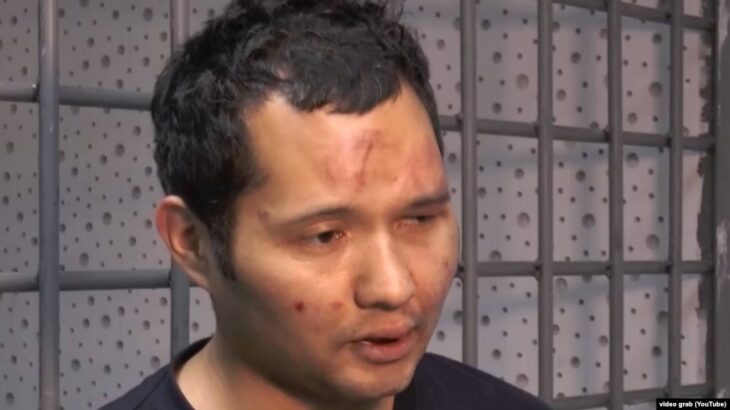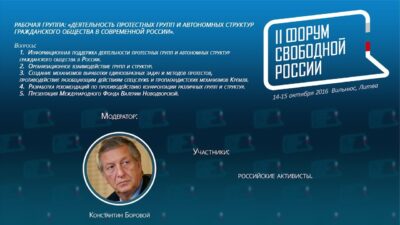
Kazakhstan has been experiencing the worst violence in its 30-year history in the last week after a popular uprising led to mayhem.
Kazakh President Qasym-Zhomart Toqaev has blamed “foreign-trained terrorists” for the unrest and subsequent casualties.
State television channel Qazaqstan showed a video of one of the alleged foreign terrorists on January 9.
With clear marks of a recent beating on his face, a young man said: “On [January 1], unknown people contacted me and offered me 90,000 tenge (about $207) to take part in meetings [in Kazakhstan]. And since I’m unemployed in Kyrgyzstan, I agreed.”
This was supposedly the face of one of the foreign terrorists the president had mentioned, except the man on Kazakh television was not a terrorist.
The video made the rounds on social media and people in Kyrgyzstan recognized the man as Vikram Ruzakhunov, a well-known jazz pianist who regularly traveled to Kazakhstan.
It touched off anger in Bishkek, where fellow musicians came out in support of Ruzakhunov and people demonstrated outside the Kazakh Embassy.
The head of Kyrgyzstan’s State Committee for National Security, Kamchyek Tashiev, said “there is no way Vikram Ruzakhunov can be prosecuted as a terrorist. We cannot and will not sit still when our citizen is being accused, especially of terrorism.”
The incident has created a rift in Kazakh-Kyrgyz ties at a time when Bishkek authorities just approved sending 150 soldiers to join Russian-led “peacekeepers” in Kazakhstan, a decision that upset many people in Kyrgyzstan as being unnecessary and unjustified.
Nur-Sultan’s publicized version of recent events in Kazakhstan has been unconvincing to many.
Small-scale, peaceful protests that started in western Kazakhstan after the new year in response to a sudden steep hike in the price of auto fuel in the region sparked other rallies that spontaneously spread across the country. And while the protests generally focused on government failures to make socioeconomic and political reforms, there were no leaders and many of the demands differed from region to region.
With protests having broken out in almost every major city in the country in just a few days, the situation changed overnight on January 5-6 when groups that do not appear to have been part of the original protests showed up and started violent actions.
Toqaev suddenly used the violence to claim it was being led by foreign-trained and -funded terrorists, and he appealed for help from the Russian-led Collective Security Treaty Organization, which quickly complied by sending troops to a member state for the first time in its 30-year history.
Who were the people who carried out the violent acts and what was their purpose?
After seeing the Kazakh state TV video of Ruzakhunov, there is reason to wonder if the truth will ever be known.
Ruzakhunov’s alleged “confession” in front of the camera was quite elaborate.
Besides saying he was invited to come to Kazakhstan by unknown people who bought him a ticket for January 2, the musician also said he was taken to a room where there were Tajik and Uzbek citizens — “about 10 of them” — and that he was frightened and decided to return to Kyrgyzstan before he was detained in the village of Samsy, some 70 kilometers west of Almaty, on January 3.
Ruzakhunov’s relatives said he bought a plane ticket to Almaty on December 16 so he could attend a concert.
It was a rough beginning for Kazakh authorities, who will be expected by their citizens to prove the claims of foreign terrorists being responsible for what many think was violence sparked by rivalries between government factions.
Ruzakhunov was released from custody on January 10 and returned to Kyrgyzstan, where he told journalists he had not been tortured. He said he sustained the injuries on his face when Kazakh police detained him.
Asked about his videotaped “confession,” he said the men filming him told him if he admitted to taking money to participate in the “meetings” he would be deported immediately.
And while Kyrgyz officials have already expressed their dissatisfaction and concern about what seems an attempt to frame Ruzakhunov for terrorism, his comments implicating Tajik and Uzbek citizens could be an indication that some of the thousands of Central Asian migrant laborers from Kyrgyzstan, Tajikistan, and Uzbekistan could become the scapegoats to “prove” Toqaev’s assertions that “foreign terrorists” are behind Kazakhstan’s recent problems.
Most migrant laborers from Central Asia go to Russia to find work but some only go as far as Kazakhstan, where wages are still significantly higher than at home.
There are already reports that at least five Kyrgyz have been detained in Kazakhstan in connection with the violence, though one report said 38 Kyrgyz citizens were being held just in the southern city of Shymkent. A later report said they had been released.
The Kyrgyz Foreign Ministry said Kazakh authorities are preventing lawyers from seeing the detained Kyrgyz citizens and the ministry had sent a note of protestto Kazakhstan’s prosecutor-general over Ruzakhunov’s case.
Tajik and Uzbek officials have been quiet so far about the fate of their citizens working in Kazakhstan, but judging by Ruzakhunov’s seemingly coerced confession, the coming days may see many migrant laborers detained.




